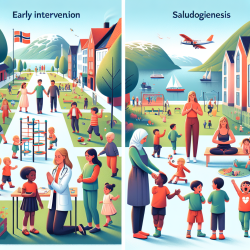Unlocking the Potential of Geriatric Co-Management for Child Outcomes
As professionals dedicated to enhancing child outcomes, it is crucial to explore diverse research areas that might not seem directly related but offer valuable insights. One such area is the geriatric co-management programs, which have been thoroughly evaluated in the research article titled Quality indicators for in-hospital geriatric co-management programmes: a systematic literature review and international Delphi study. This study provides a comprehensive framework that can be adapted to improve child therapy programs.
Understanding the Research
The study aimed to establish consensus on structure, process, and outcome indicators for evaluating geriatric co-management programs. Conducted across Western Europe and the USA, it involved experts with at least two years of clinical experience in geriatric co-management. The research identified 31 indicators considered both appropriate and feasible, focusing on early intervention, comprehensive assessments, and interdisciplinary care.
Applying Insights to Child Therapy
While the study centers on geriatric care, its principles can be adapted to enhance child therapy outcomes. Here are key takeaways:
- Early Intervention: Just as geriatric programs emphasize early intervention within 24 hours of hospital admission, child therapy can benefit from prompt assessments and interventions, especially for children with developmental delays.
- Comprehensive Assessment: The comprehensive geriatric assessment model can be mirrored in child therapy, focusing on a multidimensional approach that includes medical, psychological, and functional evaluations.
- Interdisciplinary Collaboration: The success of geriatric co-management lies in the collaboration between various healthcare professionals. Similarly, child therapy can be enhanced through a team approach involving speech-language pathologists, occupational therapists, and educators.
Encouraging Further Research
The study's methodology, using a Delphi process to achieve consensus among experts, is a valuable model for developing quality indicators in child therapy. Practitioners are encouraged to engage in similar research initiatives to identify and validate effective practices tailored to children's needs.
Conclusion
By exploring and adapting insights from geriatric co-management programs, child therapy practitioners can enhance their practice and improve outcomes. Implementing structured, evidence-based approaches and fostering interdisciplinary collaboration are key strategies that can be adapted to benefit children. For a deeper understanding, practitioners are encouraged to read the original research paper.
To read the original research paper, please follow this link: Quality indicators for in-hospital geriatric co-management programmes: a systematic literature review and international Delphi study.










